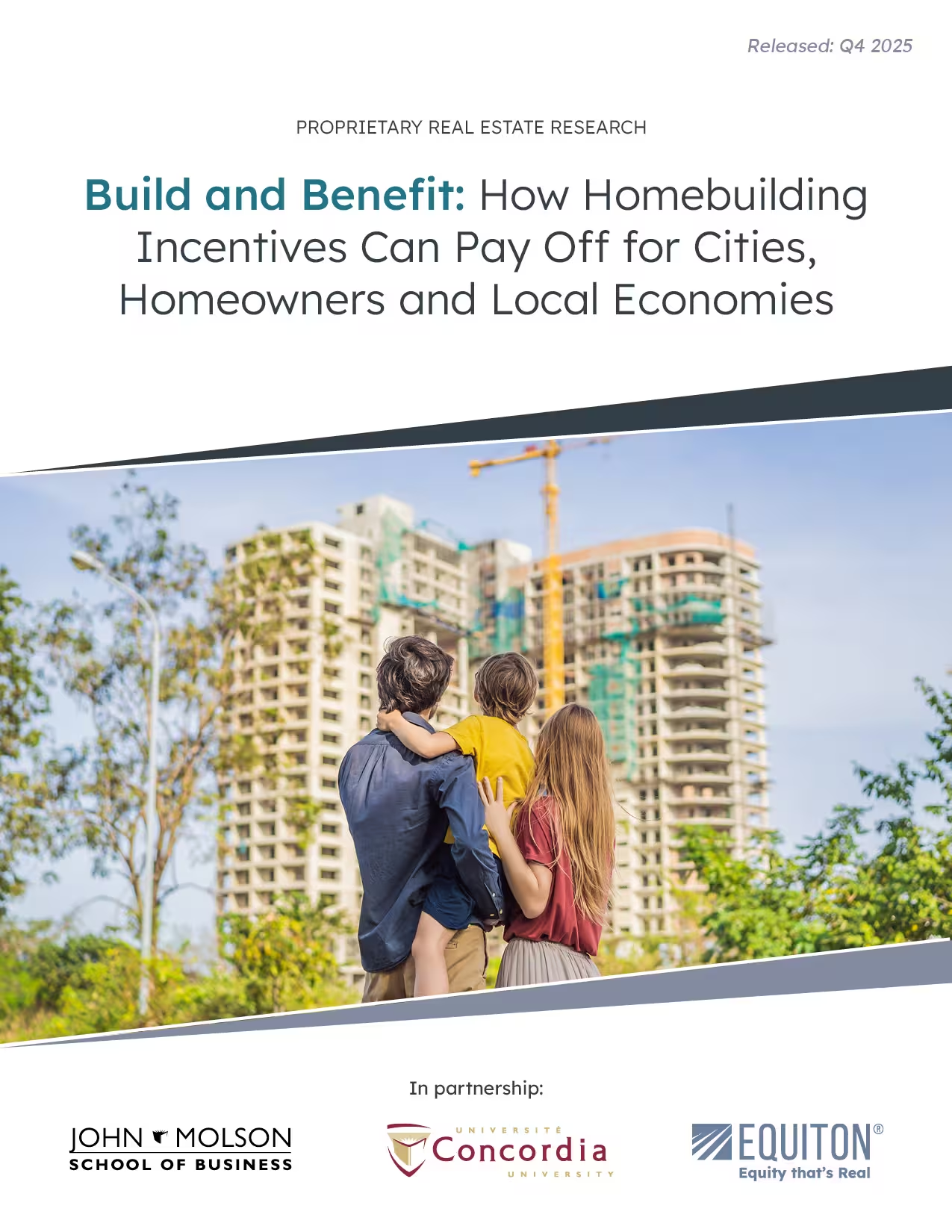Build and Benefit: How Homebuilding Incentives Can Pay Off for Cities, Homeowners, and Local Economies
Canada’s housing crisis calls for policy decisions backed by empirical research. Equiton partnered with the John Molson School of Business at Concordia University to highlight the scale of change required and some of the wide-reaching positive economic impacts of improved home affordability.
Included in this research:
- A data-driven look at how much more housing supply is needed to address affordability
- Impact of approval delays on affordability
- Impact of improved home affordability on business activity
- Spillover affordability effects from big cities to surrounding areas
- The Build and Benefit Cycle, an illustration of the positive economic benefits of a government incentive program for housing supply
Canada’s housing crisis calls for policy decisions backed by empirical research. Equiton partnered with the John Molson School of Business at Concordia University to highlight the scale of change required and some of the wide-reaching positive economic impacts of improved home affordability.
Included in this research:
- A data-driven look at how much more housing supply is needed to address affordability
- Impact of approval delays on affordability
- Impact of improved home affordability on business activity
- Spillover affordability effects from big cities to surrounding areas
- The Build and Benefit Cycle, an illustration of the positive economic benefits of a government incentive program for housing supply
Highlights:
Highlights:
- Canada needs to more than double 2024’s annual rate of building to 3.5-4% of existing supply before affordability begins to improve. For substantial progress, we need much more.
- Doubling last year’s elevated pace of construction is especially daunting in major cities. Toronto would need to complete 96,000 more units annually. Meanwhile, Montreal, Vancouver, and Calgary would need 77,000, 44,000, and 24,000, respectively.
- Public investments in homebuilding can help reshape the affordability picture. Using the Mortgage Pressure Index, a fresh approach to measuring affordability, the study finds a 20% reduction in approval delays could mean a 17% improvement in affordability.
- Greater affordability can fuel business activity and local revenue growth as households experience greater levels of disposable income.
- Improving affordability in Canada’s major cities could also benefit surrounding regions. A 20% improvement against 2024 affordability levels in some of Canada’s largest cities could reduce median home prices in peripheral areas by 5-15%.
- In the Toronto illustration of our study’s Build and Benefit Cycle, a $3 billion housing-supply incentive program could generate roughly $670 million in recurring annual tax inflows, implying a four-to-five-year fiscal payback — even before further positive multiplier effects are considered.
Author:
Dr. Erkan Yönder, Associate Professor of Real Estate and Finance, John Molson School of Business at Concordia University
Dr. Erkan Yönder is an Associate Professor of Real Estate Finance and serves as the Director of the Jonathan Wener Centre for Real Estate at the John Molson School of Business, Concordia University. With a primary focus on real estate finance, Erkan’s expertise lies in commercial real estate and sustainable real estate. Erkan’s research has found its way into esteemed academic journals and has secured multiple grants from renowned institutions such as the National Pension Hub (NPH) and the European Public Real Estate Association (EPRA). Notably, his research earned him the Nick Tyrrell Real Estate Research Prize in the UK and the distinguished Best Published Article Award from Principles for Responsible Investment (PRI), a United Nations-supported initiative. Erkan has had the privilege of presenting his scholarly work at some of the world’s leading universities, including MIT, Yale University, the University of California, Los Angeles (UCLA), and Cornell University. Erkan received his PhD degree in Finance and Real Estate at Maastricht University.
- Canada needs to more than double 2024’s annual rate of building to 3.5-4% of existing supply before affordability begins to improve. For substantial progress, we need much more.
- Doubling last year’s elevated pace of construction is especially daunting in major cities. Toronto would need to complete 96,000 more units annually. Meanwhile, Montreal, Vancouver, and Calgary would need 77,000, 44,000, and 24,000, respectively.
- Public investments in homebuilding can help reshape the affordability picture. Using the Mortgage Pressure Index, a fresh approach to measuring affordability, the study finds a 20% reduction in approval delays could mean a 17% improvement in affordability.
- Greater affordability can fuel business activity and local revenue growth as households experience greater levels of disposable income.
- Improving affordability in Canada’s major cities could also benefit surrounding regions. A 20% improvement against 2024 affordability levels in some of Canada’s largest cities could reduce median home prices in peripheral areas by 5-15%.
- In the Toronto illustration of our study’s Build and Benefit Cycle, a $3 billion housing-supply incentive program could generate roughly $670 million in recurring annual tax inflows, implying a four-to-five-year fiscal payback — even before further positive multiplier effects are considered.
Author:
Dr. Erkan Yönder, Associate Professor of Real Estate and Finance, John Molson School of Business at Concordia University
Dr. Erkan Yönder is an Associate Professor of Real Estate Finance and serves as the Director of the Jonathan Wener Centre for Real Estate at the John Molson School of Business, Concordia University. With a primary focus on real estate finance, Erkan’s expertise lies in commercial real estate and sustainable real estate. Erkan’s research has found its way into esteemed academic journals and has secured multiple grants from renowned institutions such as the National Pension Hub (NPH) and the European Public Real Estate Association (EPRA). Notably, his research earned him the Nick Tyrrell Real Estate Research Prize in the UK and the distinguished Best Published Article Award from Principles for Responsible Investment (PRI), a United Nations-supported initiative. Erkan has had the privilege of presenting his scholarly work at some of the world’s leading universities, including MIT, Yale University, the University of California, Los Angeles (UCLA), and Cornell University. Erkan received his PhD degree in Finance and Real Estate at Maastricht University.
This project was commissioned by the Equiton Research Fund in Real Estate at the John Molson School of Business. Equiton values and upholds the principle of academic independence in all its research partnerships.
This project was commissioned by the Equiton Research Fund in Real Estate at the John Molson School of Business. Equiton values and upholds the principle of academic independence in all its research partnerships.









